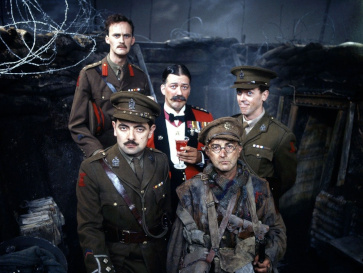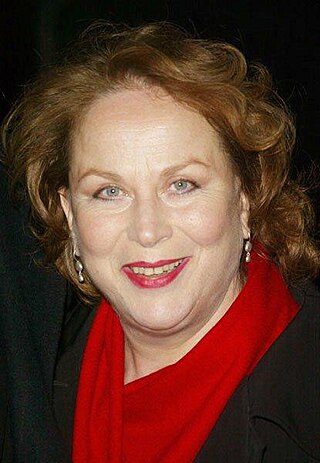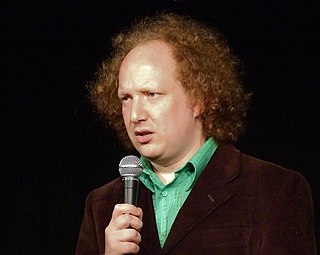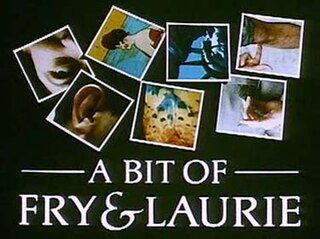Related Research Articles

Blackadder is a series of four period British sitcoms, plus several one-off instalments, which originally aired on BBC One from 1983 to 1989. All television episodes starred Rowan Atkinson as the antihero Edmund Blackadder and Tony Robinson as Blackadder's dogsbody, Baldrick. Each series was set in a different historical period, with the two protagonists accompanied by different characters, though several reappear in one series or another, e.g., Melchett and Lord Flashheart.
Doublespeak is language that deliberately obscures, disguises, distorts, or reverses the meaning of words. Doublespeak may take the form of euphemisms, in which case it is primarily meant to make the truth sound more palatable. It may also refer to intentional ambiguity in language or to actual inversions of meaning. In such cases, doublespeak disguises the nature of the truth.

Stephen John Fry is an English actor, broadcaster, comedian, director and writer. He first came to prominence in the 1980s as one half of the comic double act Fry and Laurie, alongside Hugh Laurie, with the two starring in A Bit of Fry & Laurie (1989–1995) and Jeeves and Wooster (1990–1993). He also starred in the sketch series Alfresco (1983–1984) alongside Laurie, Emma Thompson and Robbie Coltrane, and in Blackadder (1986–1989) alongside Rowan Atkinson. Since 2011, he has served as president of the mental health charity Mind.

Gordon Angus Deayton is an English actor, writer, musician, comedian, and broadcaster.

James Hugh Calum Laurie is an English actor, comedian, writer, and musician. He first gained recognition for his work as one half of the comedy double act Fry and Laurie with Stephen Fry. The two men acted together in a number of projects during the 1980s and 1990s, including the BBC sketch comedy series A Bit of Fry & Laurie and the P. G. Wodehouse adaptation Jeeves and Wooster. He appeared in two series of the period comedy Blackadder (1987–1989) alongside Rowan Atkinson.

The Young Ones is a British sitcom written by Rik Mayall, Ben Elton, and Lise Mayer, starring Adrian Edmondson, Mayall, Nigel Planer, Christopher Ryan, and Alexei Sayle, and broadcast on BBC Two for two series, first shown in 1982 and 1984. The show focused on the lives of four dissimilar students and their landlord's family on different plots that often included anarchic, offbeat, surreal humour. The show often included slapstick gags, visual humour and surreal jokes sometimes acted out by puppets, with each episode also featuring a notable selection of guest stars and musical numbers from various performers.

Jeeves and Wooster is a British comedy-drama television series adapted by Clive Exton from P. G. Wodehouse's "Jeeves" stories. It aired on the ITV network from 22 April 1990 to 20 June 1993, with the last series nominated for a British Academy Television Award for Best Drama Series. Set in the UK and the US in an unspecified period between the late 1920s and the 1930s, the series starred Hugh Laurie as Bertie Wooster, an affable young gentleman and member of the idle rich, and Stephen Fry as Jeeves, his highly intelligent and competent valet. Bertie and his friends, who are mainly members of the Drones Club, are extricated from all manner of societal misadventures by the indispensable Jeeves.

Room 101 is a BBC comedy television series based on the radio series of the same name, in which celebrities are invited to discuss their pet hates and persuade the host to consign those hates to oblivion in Room 101, a location whose name was inspired by the torture room in George Orwell's 1949 novel Nineteen Eighty-Four which reputedly contained "the worst thing in the world". Orwell himself named it after a meeting room in Broadcasting House where he would sit through tedious meetings. It was produced independently for the BBC by Hat Trick Productions.

Blackadder the Third is the third series of the BBC sitcom Blackadder, written by Richard Curtis and Ben Elton, which aired from 17 September to 22 October 1987. The series is set during the Georgian Era, and sees the principal character, Mr. E. Blackadder, serve as butler to the Prince Regent and have to contend with, or cash in on, the fads of the age embraced by his master.

Pamela Ferris is a Welsh actress. She has starred in numerous British television series, including Connie (1985), The Darling Buds of May (1991–1993), Where the Heart Is (1997–2000), Rosemary & Thyme (2003–2006), and Call the Midwife (2012–2016). For her role as Peggy Snow in Where the Heart Is she was nominated three times for Most Popular Actress at the National Television Awards.

British humour carries a strong element of satire aimed at the absurdity of everyday life. Common themes include sarcasm, tongue-in-cheek, banter, insults, self-deprecation, taboo subjects, puns, innuendo, wit, and the British class system. These are often accompanied by a deadpan delivery which is present throughout the British sense of humour. It may be used to bury emotions in a way that seems unkind in the eyes of other cultures. Jokes are told about everything and almost no subject is off-limits, though a lack of subtlety when discussing controversial issues is sometimes considered insensitive. Many British comedy series have become successful internationally, serving as a representation of British culture to overseas audiences.

Fry and Laurie are English comedy double act, mostly active in the 1980s and 1990s. The duo consisted of Stephen Fry and Hugh Laurie, who met in 1980 through mutual friend Emma Thompson while all three attended the University of Cambridge. They initially gained prominence in a television sketch comedy, A Bit of Fry & Laurie, and have collaborated on numerous other projects including, most notably, the television series Jeeves and Wooster (1990–1993) in which they portrayed P. G. Wodehouse's literary characters Jeeves (Fry) and Wooster (Laurie).

Nineteen Eighty-Four is a British television adaptation of the 1949 novel of the same name by George Orwell, originally broadcast on BBC Television in December 1954. The production proved to be hugely controversial, with questions asked in Parliament and many viewer complaints over its supposed subversive nature and horrific content. In a 2000 poll of industry experts conducted by the British Film Institute to determine the 100 Greatest British Television Programmes of the 20th century, Nineteen Eighty-Four was ranked in seventy-third position.
Life with the Lyons was a British radio and television domestic sitcom from the 1950s.
Rowland John Rivron is a British writer, comedic actor and television personality.
George Orwell's 1949 dystopian political novel Nineteen Eighty-Four, has been adapted for the cinema, radio, television, theatre, opera and ballet.

Benjamin John Whitrow was an English actor. He was nominated for the BAFTA TV Award for Best Actor for his role as Mr Bennet in the 1995 BBC version of Pride and Prejudice, and voiced the role of Fowler in the 2000 animated film Chicken Run. His other film appearances include Quadrophenia (1979), Personal Services (1987) and Bomber (2009).

A Bit of Fry & Laurie is a British sketch comedy television series written by and starring former Cambridge Footlights members Stephen Fry and Hugh Laurie, broadcast on both BBC1 and BBC2 between 1989 and 1995. It ran for four series and totalled 26 episodes, including a 36-minute pilot episode in 1987.

Nineteen Eighty-Four is a dystopian social science fiction novel and cautionary tale by English writer George Orwell. It was published on 8 June 1949 by Secker & Warburg as Orwell's ninth and final book completed in his lifetime. Thematically, it centres on the consequences of totalitarianism, mass surveillance and repressive regimentation of people and behaviours within society. Orwell, a democratic socialist, modelled the authoritarian state in the novel on Stalinist Russia and Nazi Germany. More broadly, the novel examines the role of truth and facts within societies and the ways in which they can be manipulated.

A statue of George Orwell by the British sculptor Martin Jennings was unveiled on 7 November 2017 outside Broadcasting House, the headquarters of the BBC, in London.
References
- 1 2 3 "BBC Radio 4 Extra - Nineteen Ninety-Four, Work Is Freedom". BBC.
- ↑ Osborne, William; Turner, Richard. Nineteen Ninety-four. Arrow Books. ISBN 978-0-09-945150-1.
- 1 2 "BBC Radio 4 Extra - Nineteen Ninety-Four, Happiness Is Work". BBC.
- ↑ "BBC Radio 4 Extra - Nineteen Ninety-Four, Freedom Is Choice". BBC.
- ↑ "BBC Radio 4 Extra - Nineteen Ninety-Four, Choice Is Progress". BBC.
- ↑ "BBC Radio 4 Extra - Nineteen Ninety-Four, Progress Is Power". BBC.
- ↑ "BBC Radio 4 Extra - Nineteen Ninety-Four, Power Is Happiness". BBC.
- ↑ Osborne, William; Turner, Richard. Nineteen Ninety-eight. Sphere Books. ISBN 978-0-7221-6581-2.